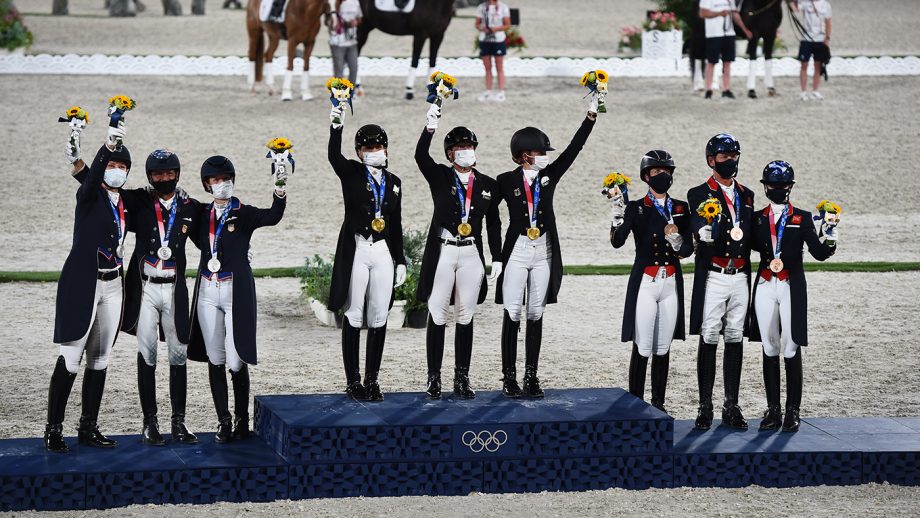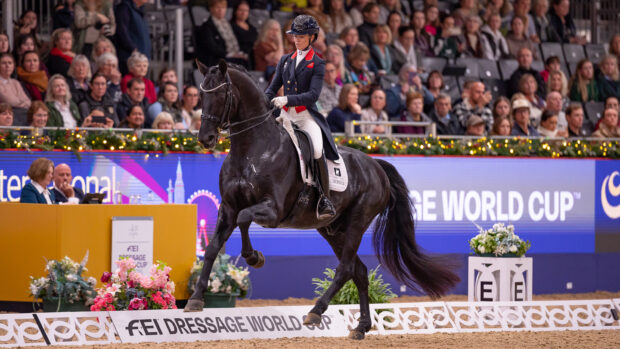The equestrian world must be on the front foot to showcase the fact horse sport has “a sound, ethical basis” if it is to survive and thrive in years to come.
World Horse Welfare chief executive Roly Owers and FEI president Ingmar de Vos both highlighted how public attention centres on sporting’s regulators in times of controversy – regardless of when or where an incident happened.
The pair stressed that equestrianism needs to constantly challenge itself “with as much energy as we invest in competition” to ensure it is always doing the best for horses. By doing so, they say, equestrianism can “win public opinion and a flourishing future”.
Their speeches echoed messages given at the launch of the British racing industry’s Horse Welfare Board five-year-plan in February 2020 (“a life well lived”), an overarching welfare strategy covering thoroughbreds from birth to death. “We can have the best welfare in the world and if we are not telling people about it, we can find ourselves on the back foot,” said programme director Alison Enticknap at the time.
H&H has reported on the need for horse sport to keep its social licence to operate — essentially public acceptance of the involvement of horses in sport.
At the FEI general assembly (14-17 November), Mr Owers shared a quote by American philosopher Bernard Rollin to explain more clearly: “Society basically says to professions it does not understand well enough to regulate: ‘You regulate yourselves the way we would regulate you if we understood what you do, which we don’t. ‘But we will know if you don’t self-regulate properly and then we will regulate you, despite our lack of understanding.’”
Mr de Vos said debates and consultations are “key to a healthy and forward-thinking sport”.
“Horse welfare is always given absolute priority in our sport and in this organisation,” he said.
“The tragic accident in [Olympic] eventing, the unacceptable situation in modern pentathlon, for which we were wrongly blamed, are only some examples to remind us that people see us as the governing body responsible for equestrian sport and for the welfare of our friend and partner, the horse. We must continue to scrutinise our field of play to ensure we always have the very safest conditions for our human and equine athletes.
“It was also a reminder that we must continue to educate the non-equestrian community about equestrian sport and our values. There is a lot of misinformation that exists out there and could threaten the integrity of the sport we love.
“The social licence to operate is probably becoming the most important priority on our to-do list, and the FEI board will need to think how to tackle this. But I also invite you to provide us with your input and suggestions.”
Mr Owers underscored the power a single moment in time has to form an opinion in a person’s mind, referencing how Ada Cole witnessing the treatment of equines in Antwerp at the end of World War I led to the formation of the charity.
“It was about 100 years ago that Ada founded World Horse Welfare,” he said. “But what never changes is the ability of a snapshot in time to make a significant impact on someone’s opinion. And the ability for people to use that opinion to create change, for better or for worse. I believe both of these facts are especially pertinent for horse sport and horse racing today.”
He added that World Horse Welfare “seeks to help” and as part of this, has developed the ethical framework for equestrian sport with the Royal Veterinary College.
“All regulators have rules in place to protect welfare during competition. But they do not govern many of the other factors that impact welfare in horse sport, such as breeding, training methods, horse management and aftercare,” he said.
“However, increasingly society now holds horse sport responsible for how horses are treated from birth till death. The racing industry is a really good example of this. There has been a lot of criticism this year and indeed over the past few years about former racehorses going to slaughter in Korea, Australia, Ireland and the UK.
“Earlier this year there was an image of a leading racehorse trainer sitting atop a dead horse. None of these incidents took place on a course, but they have a huge impact on public opinion – an element of which is increasingly questioning horse sport. In fact, there is a vocal minority questioning whether riding horses is ethical at all. So it is vital that horse sport acts to claim the ethical ground and proactively demonstrate that horse sport has a sound, ethical basis.”
‘Society will judge us on the treatment of the horse’
Mr Owers also spoke of the contrasting ways in which situations were handled by the equestrian disciplines, compared to modern pentathlon, in Tokyo.
“The eyes of the public were certainly on the Olympic Games this summer and it was truly inspiring to see such brilliant sport in all the disciplines,” he said.
“There were challenges too, as there always are with horses. Including the sad euthanasia of Jet Set, and Kilkenny’s bout of epistaxis [nosebleed]. However, the way the FEI and those connected with horses – these horses – handled those situations showed true respect for the horse and a desire to protect their welfare.
“This, I would suggest, contrasted with the disturbing scenes during the women’s modern pentathlon competition, which deserved a strong reaction from the public, I’m sure. But not the loud calls from some to completely ban so-called abusive equestrian sports from the Olympics.”
He added: “No one could condone what happened in modern pentathlon at this year’s Olympics, but the issue wasn’t that horses were being ridden but how the horses were ridden and the rules of the competition. There is a risk that some will see this change as vindication of their view that horse welfare will always suffer when horses compete. A position we would utterly refute. In our view, the UIPM has made the wrong decision.”
Mr Owers spoke of what equestrianism risks if it loses its social licence.
“Only we have the power to maintain our social licence,” he said. “Social licence is so much more than a concept. It is a demand that we consider the views of all our stakeholders and for horse sport’s social licence, the horse is the key stakeholder. And society will judge us on the treatment of the horse.”
He added that this will require “bravery and proactivity” and communication with the public, who may have a different understanding or values system from our own.
“We have such a great story to tell about the horse-human partnership, about what makes our horses such impressive athletes as well as such engaging characters,” he said.
“We need to demonstrate that it is a true partnership, based on respect. And where there is no respect, there are serious sanctions.
“Above all, we must do right by our horses and truly put their welfare first in ways that we may have never considered before. We can do this. And if we do this, with as much energy as we invest in competition, we will win public opinion and a flourishing future for our sport.”
You might also be interested in:

Three to a team gets the nod for Paris 2024 despite concerns

Whose opinion matters, on equine health and welfare?

Subscribe to Horse & Hound magazine today – and enjoy unlimited website access all year round

Why equids must be part of plans to cope with climate change

How to engage with public to ensure our sport survives
Horse & Hound magazine, out every Thursday, is packed with all the latest news and reports, as well as interviews, specials, nostalgia, vet and training advice. Find how you can enjoy the magazine delivered to your door every week, plus options to upgrade your subscription to access our online service that brings you breaking news and reports as well as other benefits.




